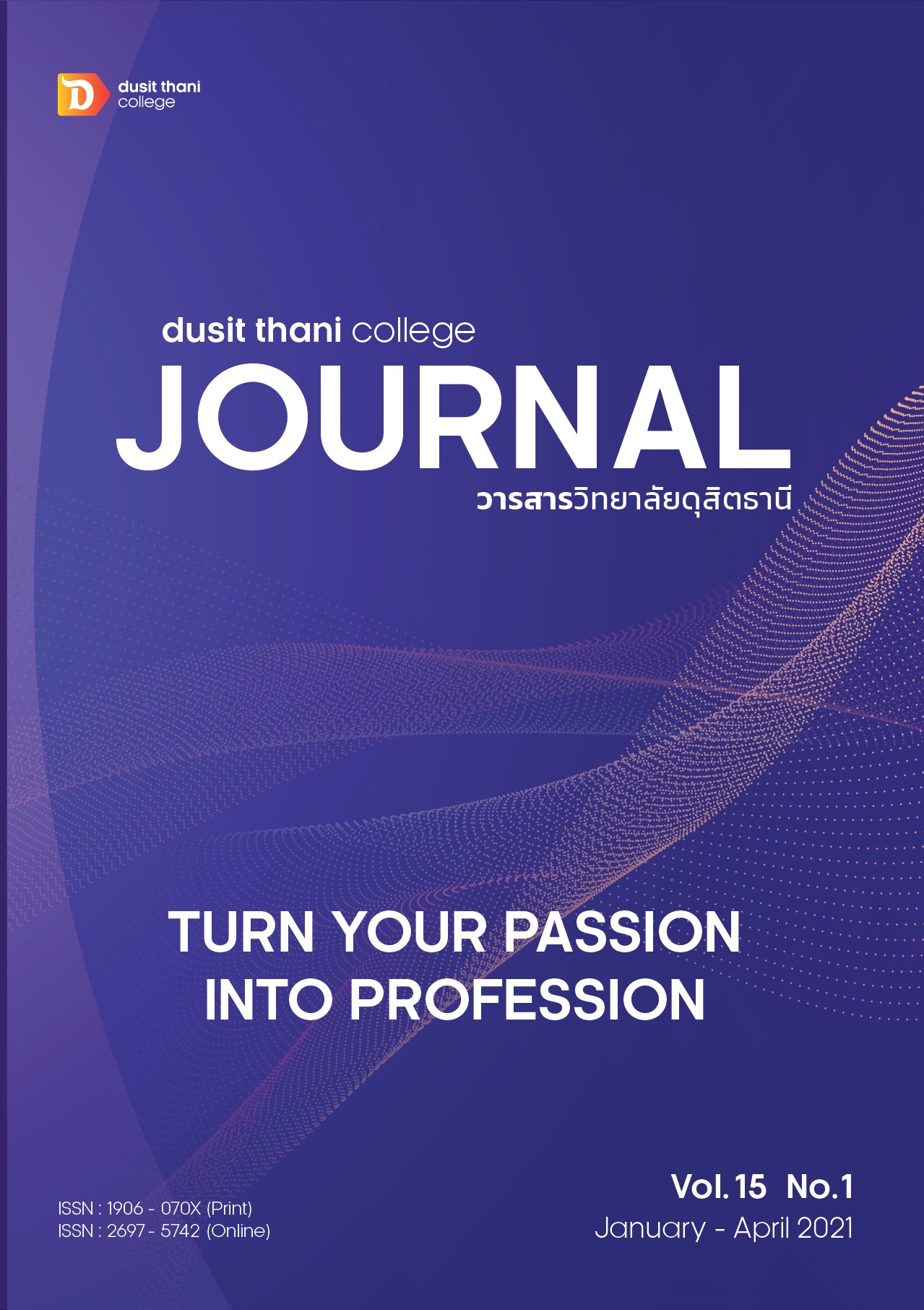CULTURAL TOURISM MANAGEMENT FOR SUSTAINABLE TOURISM IN KRABI PROVINCE, THAILAND
Main Article Content
Abstract
The objectives of this research were 1) to investigate the attitudes of tourists towards cultural tourism in Krabi province; 2) to investigate all stakeholders to participate in determining a sustainable tourism in Krabi province; 3) to investigate the process of management for cultural tourism in Krabi province; 4) to propose the guidelines for cultural tourism management achieving sustainable tourism in Krabi province. This research employed the qualitative approach utilizing documentary research, site surveys and in-depth interview with 18 key informants consist of 3 government officials, 3 hospitality entrepreneurs, 3 cultural experts, 3 Buddhist monks, 3 local residents and 3 tourists who have an experience on cultural tourism directly and it is a suitable for this research.
The result found that a small number of tourists know about cultural tourism but they need to support the promotion of cultural tourism in Krabi province. All stakeholders have to understand much its value and what they get the benefits from cultural tourism. The processes of cultural tourism management consist of the initiating cooperation, conservation, management and new creation should be created by the stakeholders from the early stage. The guidelines for cultural tourism management achieving sustainable tourism are concentrated on conservation that is a basic principle of sustainable tourism development relating with social values, economic activities, and local development. It can suggest the stakeholders how to manage the cultural tourism systematically and efficiently. It can develop and create new structures on an area with contemplating analysis and brainstorming of stakeholders effectively. Therefore, the guidelines can be enhanced the strength of local economies though tourism, encouraging provincial administrators, and all stakeholders to participate in determining a sustainable tourism in Krabi province.
Article Details
Article Screening Policy
- All research and academic articles to be published must be considered and screened by three peer reviews in the relevant field / article.
- All articles, texts, illustrations and tables published in the journal are the personal opinions of the authors. Editors don't always have to agree. And no responsibility whatsoever is the sole responsibility of the author.
- The articles to be published must never be published. Where did you first publish? And not in the consideration of other journals If the audit found that there has been a duplicate publication It is the sole responsibility of the author.
- Any article that the reader sees as being plagiarized or impersonated without reference. Or mislead the work of the author Please let the journal editor know it will be your greatest blessing.
References
wp-content/uploads/The-Burra-Charter-2013-adopted-31.10.2013.pdf
CBI. (1971).What are the opportunities for cultural tourism from Europe? Retrieved from https://www.cbi.eu/market-information/tourism/cultural-tourism/cultural-tourism-europe
Eser, S., Dalgin, T., & Ceken, H. (2013). Cultural tourism as Sustainable Tourism Type:
The Ephesus Example. Social Sciences, 1(79). 17-22.
ICOMOS International Cultural Tourism. Charter. (1999). Managing Tourism at Places of Heritage Significance. Retrieved from https://www.icomos.org/charters/tourism_e.pdf
Ilievska, A. Z. (2018). Public Relations Management in the Tourism Industry.
International Journal of Research in Humanities, Arts and Literature, 6(4). 83-94.
Karnnatawe, K. (2015). 2015—a year for Thai tourism? Bangkokpost. Retrieved from http://www.bangkokpost.com/travel/in-thailand/805148/2015-a-year-for- thai- tourism
Khlaikaew, K. (2015). The Cultural Tourism Management under Context of World Heritage Sites: Stakeholders’ Opinions between Luang Prabang Communities, Laos and Muang-kao Communities Sukhothai, Thailand. Procidia Economics and Finance,
23. 1286-1295.
Kozak, M., & Baloglu, S. (2011). Managing and Marketing Tourist Destinations.New York: Routledge.
Krabi Provincial Hall. (2011). Five scenic routes to discover the Krabi. Retrieved from http://krabi.go.th/krabiweb/gdtravel/1/
Krabihotelvilla. (2019) Map. Retrieve from http://www.krabihotelvilla.com
Marzuki, A., Hay, I., & James, J. (2012). Public participation shortcomings in tourism planning: the case of the Langkawi Islands, Malaysia. Journal of Sustainable Tourism 20 (4). 585–602
Mason, P. (2003). Tourism impacts, planning and management. Butterworth Heinemann: London.
Mason, P. (2008). Tourism impacts, planning and management (2nd ed.). Oxford, UK: Elsevier.
McKercher, B. & du Cros, H. (2002). Cultural tourism: The partnership between tourism and cultural heritage management. NY: The Haworth Hospitality.
Rasoolimanesh, S. M., & Jaafar, M. (2016). Sustainable tourism development and residents’ perceptions in World Heritage Site destinations. Asia Pacific Journal of Tourism Research,1-15. Retrieved from http://dx.doi.org/10.1080/10941665.2016.1175491
Simkova, E. (2009). Knowledge management in Tourism. Proceedings in ICL Conference Villach, Austria.
Tiden, F. (1977). Interpreting our heritage (3rded.). Chapel Hill: The University of North Carolina.
Toth, G., & David, L. (2010). The Connection between Accessibility and Tourism.
Dethi Business Review, 11 (1). Retrieved from https://www.delhibusinessreview.org/v11n1/v11n1h.pdf
Tourism Authority of Thailand. (2016). History. Retrieved from http://www.tatnews.org/history
UNESCO Bangkok. (2009). Hoi an Protocols for Best Conservation Practice in Asia: Professional Guidelines for Assuring and Preserving the Authenticity of Heritage Sites in the Context of the Cultural of Asia. Bangkok: UNESCO Bangkok.
UNESCO. (2017). Cultural heritage. Retrieved from http://www.unesco.org/new/en/venice/
culture/safeguarding-cultural-heritage/
World Tourism Organization. (1997). International Tourism: A Global Perspective.
Madrid: WTO.
World Tourism Organization (UNWTO). (2019). Sustainable Development of Tourism.
Retrieved from https://sdt.unwto.org/content/about-us-5


